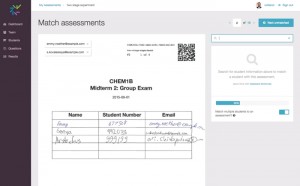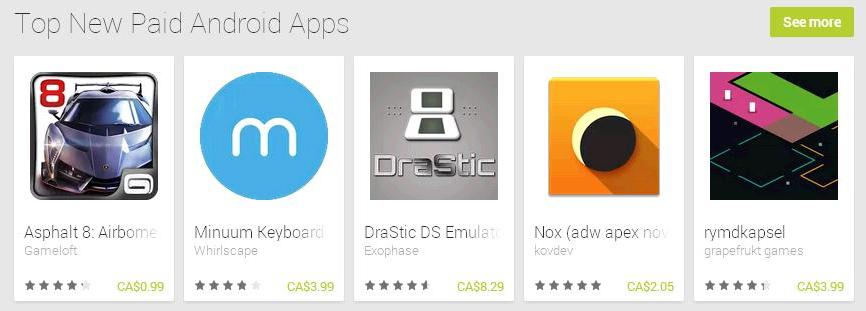MI’s Joel Liederman on CanadaAM to talk product development
Joel Liederman, vice-president of Physical Sciences, appeared on CanadaAM April 5, 2016 to talk about how to make a product. The interview is part of CanadaAM's "What's Next" segment on…
Joel Liederman, vice-president of Physical Sciences, appeared on CanadaAM April 5, 2016 to talk about how to make a product. The interview is part of CanadaAM's "What's Next" segment on…

TORONTO, Oct. 21, 2015 – Working with five leading universities in North America during 2014-15, Crowdmark Inc., a collaborative online grading and analytics platform, has demonstrated the benefits and advantages of using two-stage examinations in a number of undergraduate programs in post-secondary institutions across the world.
Crowdmark has worked with universities to introduce two-stage exams as a way to integrate collaborative learning and assessment into the traditional exam format. In a two-stage exam, students individually complete the exam and then, working in groups of three to four, immediately complete the exam again. This method provides students with immediate feedback through discussion with their peers as they deliberate the most correct response. The two-stage exam provides feedback on individual performance while increasing students’ engagement and comprehension of course content.
James Colliander, Crowdmark Founder/CEO and Professor of Mathematics at the University of British Columbia is encouraged by the reception two-stage exams have received at universities in North America.
“The experiments with two-stage exams last spring were very informative and helped shape our platform to support a new and emerging assessment scenario,” says Colliander. “Also with feedback from our customers, we made elegant improvements allowing Crowdmark to be used for other assessment types including lab reports and group projects.”

The Minuum keyboard, which made its public debut in the Google Play Store on August 21, 2013, has already reached #2 position in Google’s “Top New Paid Android Apps” list. The keyboard is the only non-game currently in that list’s top 10.
In the “Top Paid in Android Apps” general category, Minuum is already #9. The keyboard, made by Whirlscape Inc., has a four-star rating among users.

TORONTO, Canada (June 18, 2013) — Whirlscape Inc., creators of Minuum, “the little keyboard for big fingers,” today released the Android beta to the nearly 10,000 supporters who funded the keyboard’s wildly successful Indiegogo campaign.
The Minuum Project campaign raised over $87,000 (USD) through the crowdfunding platform between March and April 2013, well past its initial goal of $10,000. Whirlscape promised to release the hotly anticipated Minuum beta two months after the campaign, and has delivered on that promise.
Minuum’s beta launch to its Indiegogo supporters was covered by TechCrunch, TechCrunch Japan and Mobile Syrup. Whirlscape’s technology was also highlighted in a VentureBeat article on the future of typing.
The product was also reviewed on TechVibes and the Android Police blog: “Minuum Keyboard Beta: Good enough to renew my faith in crowd-funded campaigns.”
Minuum is a tiny, linear, one-dimensional touchscreen keyboard that re-imagines the standard QWERTY layout. It frees up mobile screen space while allowing fast, accurate typing. This touchscreen keyboard marks the first phase of the Minuum Project, which seeks to simplify typing on mobile devices—such as smartphones and tablets—and enable typing for wearable technology. The beta release is an important first step towards Minuum’s “type anywhere” future.

Dr. Raphael Hofstein, president and CEO of MaRS Innovation, was quoted in Mary Theresa Bitti‘s National Post article, “Commercialization Conundrum: Canada must turn ideas into social and economic value,” published April 3, 2013.
The article examines Canada’s worsening track record in realizing commercialization gains based on the country’s significant per-capita investment in R&D.
Here’s an excerpt:
While Canada punches above its weight class when it comes to generating ideas — witness countless academic journals showcasing Canadian research — as a country, we are experiencing a failure to launch when it comes to commercializing those ideas and getting them to market. The Jenkins panel report on innovation spelled it out quite clearly, “Too many of the big ideas [Canada] generates wind up generating wealth for others.” Canada ranks 14th out of 17 peer countries when it comes to innovation, even though on a per-capita basis, our $7-billion federal annual investment into research and development (R&D) is far more generous than other OECD nations. The result: Our global competitiveness continues to slide. According to the World Economic Forum, Canada has dropped to 14th place in 2012 from 10th in 2010.
Andrew Sinclair, CEO of OtoSim Inc. and a senior director at MaRS Innovation, describes some of the unexpected twists and turns OtoSim has weathered in bringing their product to market in…